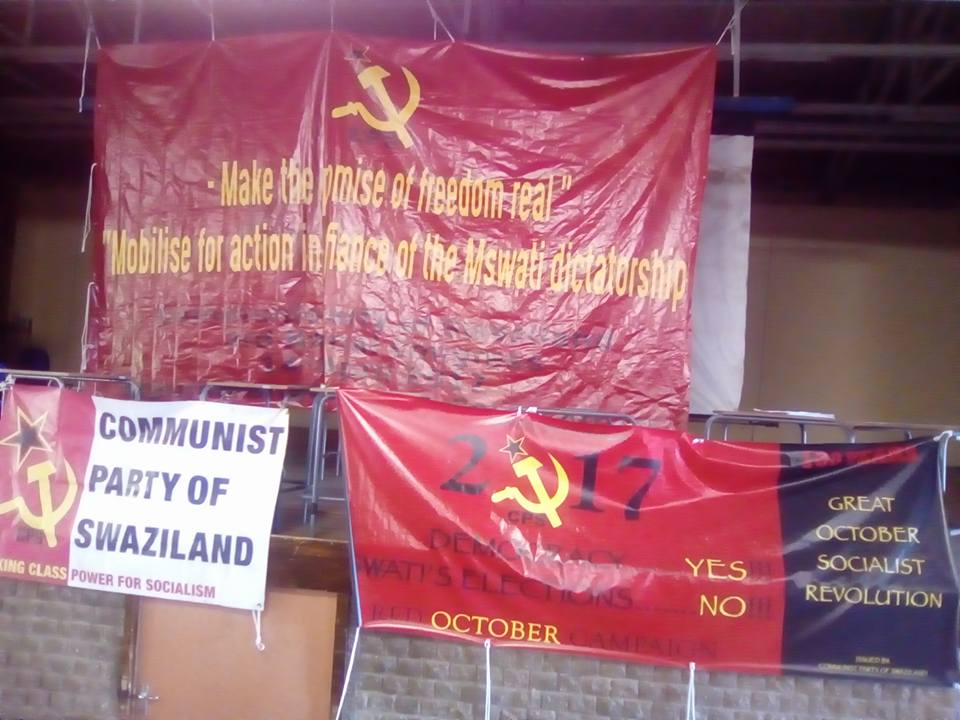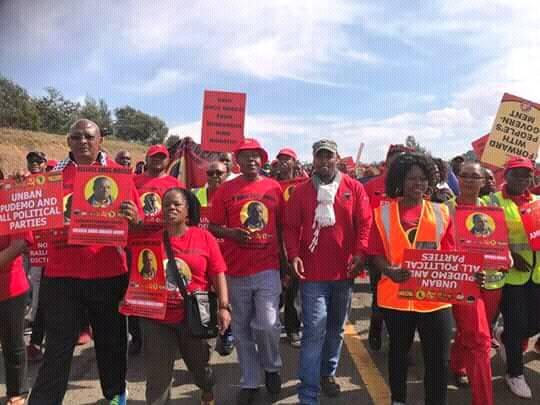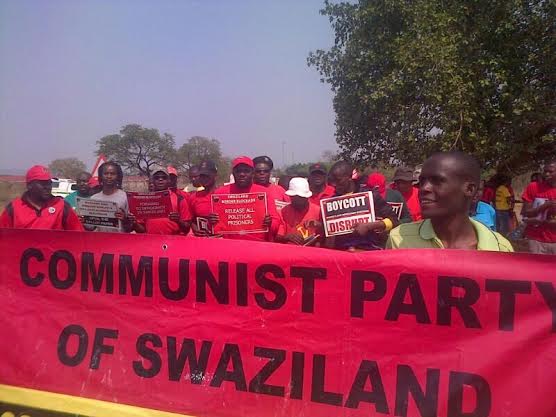One of the last absolute monarchies in the world, Swaziland is headed to a primary round of polls of August 25 under its Tinkhundla (administrative sub-division)-based electoral system. The election is happening in the background of an increasing state crackdown on those seeking an end to monarchical rule and the revoking of the ban on political parties in the country. Peoples Dispatch spoke to Njabulo Dlamini, International Organiser of the Communist Party of Swaziland (CPS), which currently operates in exile in South Africa, about the political situation and the working class struggles in the country.
Peoples Dispatch (PD): Could you tell us a bit about your organization and its work.
Njabulo Dlamini (ND): The Communist Party of Swaziland (CPS) was launched on April 9, 2011, in the Republic of South Africa. The party was formed by Swazi women and men, a number of whom were based in Swaziland and some who were in exile. These were comrades who had witnessed the [king] Mswati regime’s war against the Swazi people who are burdened by political and social oppression, as well as enforced mass poverty and very low life expectancy. The CPS was launched at a time when there was, more than ever, a need for working class direction and leadership to replace the much hated Mswati regime with a republican democratic dispensation which shall pave way for a socialist Swaziland.
We seek an absolute end to the monarchical dictatorship and the institution of a free, democratic multi-party system. We seek a revolutionary transformation of society to end poverty, disease, the oppression of women and the stifling of the youth.
The Communist Party of Swaziland is a Marxist-Leninist party that champions the socialist cause. We believe that only a socialist revolution will enable the Swazi people to begin to build a socialist society, in which there is full equality and deepened democracy. The Communist Party of Swaziland understands that freedom for the workers, peasants, the poor, the marginalized and oppressed in Swaziland is only possible by ending the capitalist system altogether and the monarchic tyranny that is its special national feature in Swaziland. Only a socialist system will provide a democracy that is far-reaching enough to rid Swaziland of its massive developmental crises, its terrible poverty and human suffering and the deep exploitation by the bourgeoisie.
PD: Swaziland is one of the last absolute monarchies. Can you tell more about the current political situation in the country?
ND: The monarch holds unlimited power. Swaziland is sub-Saharan Africa’s last such autocracy and the monarch has had total control of the political and economic life of the country since April 12, 1973. That was when Mswati III’s father, Sobhuza II, abrogated the 1968 constitution, declared a state of emergency, issued a decree that banned all political parties and organizations, and instituted absolute royal dominance.
The current monolithic system subjugates the population under a heavily patriarchal and hierarchical feudal system that is imposed in the name of cultural wholesomeness and venerated tradition. It has appointed chieftain councils that are a network of power that the king and the royal family use to maintain control. This has been effective in crushing the people and instilling a sense of fear and subservience to traditional authority. The king also maintains a hold over the people by casting himself as a semi-supernatural figure who can wield powers against his enemies. People have to prostrate themselves before him and act in total obedience to his commands.
All these have been ways through which the absolute monarchy maintains and strengthens its grip on power. In other respects, it draws on the capitalist system, which accompanies the feudal characteristics of the system, to boost its income and maintain economic control over the country
To understand the current political situation of the country, it is of paramount importance to understand, on the one hand, the forces involved in maintaining the regime, and, on the other, those forces fighting against the regime, and their general aims. The former include, among others, imperialist forces such as the European Union, the United States and Britain.
The economy of Swaziland has been ruined by the Mswati autocracy. Public hospitals and clinics do not have sufficient medication and equipment and schools are insufficiently funded, The education received by the people is of poor quality, including the curriculum which is directed at strengthening the regime’s grip on power by brainwashing the population. The country is experiencing massive job loss. Meanwhile, Mswati continues to loot public coffers to sponsor his luxurious lifestyle, whilst also stashing money in offshore accounts.
The people can no longer afford basic commodities to survive and also uplift themselves. Food prices have shot up drastically. The value added tax (VAT) has increased, putting an even more economic strain on the people, and electricity prices have been hiked unreasonably. This situation can no longer be allowed to continue.
These problems are also being exacerbated by the actions of the imperialist forces which continue to fund the regime, giving it breathing space to continue with the oppression each time it runs into an economic crisis. This has manifested itself in various ways, including the funding of free primary education by the European Union, the funding of sugarcane schemes and public hospitals, the economic manoeuvres of the Taiwanese government in Swaziland – the only African country still sharing diplomatic ties with Taiwan. The Taiwanese government has heightened its funding of the regime in national events, training of the armed forces, road infrastructure such as surveillance cameras, etc.

PD: Swaziland is going to elections on August 25 under the tinkhundla system. Can you tell us more about this?
The Mswati autocracy has been conducting an election programme this year to elect a puppet parliament for sub-Saharan Africa’s last absolute monarch to implement his decisions. This parliament is incapable of holding any public official, let alone the absolute monarch, to account.
[Swaziland has a bicameral parliament with lower house (House of Assembly) and upper house (Senate), with some of members selected by the King. Out of 66 members in the Assembly, 59 are elected from single member constituencies corresponding to tinkhundlas administrative subdivision smaller (tribal communities). Election are held by secret ballot in a first-past-the-post system of voting]
It is not representative of the people. As an absolute monarch, Mswati still reserves the power to dissolve parliament as and when he pleases. This puppet parliament is built within the tinkhundla system which is nothing but a rule by the monarch, not the people. It is therefore incapable of delivering on the wishes of the masses.
We have already seen many cases of ritual murder (and some attempts), due to these sham elections. Aspiring members of Mswati’s parliament have been actively involved in the murder of children and women with the backward belief that the body parts harvested from the victims will bolster their chances of success in the elections.
The Elections and Border Commission (EBC) has already wasted millions in public funds, going around the country coercing the people to register and vote. It has done this in collaborating with the chiefs and other government institutions to instil fear in the people.
The Communist Party of Swaziland calls for the total boycott of the tinkhundla sham elections because they are undemocratic. They do not even meet the minimum standards of free and fair elections set by SADC (eg, the SADC Principles and Guidelines Governing Democratic Elections), African Union and other international organisations to which Swaziland is affiliated.
Not only should the elections be boycotted, but practical measures must be undertaken to disrupt them, rendering the whole process ungovernable by all practical means necessary. Polling stations will be boycotted to ensure that no elections take place. The individuals who are practically contributing to the elections, whether by work or funding, will also be the target of boycott.
This means even the school principals and leaders of those churches who give space to the undemocratic regime will be placing themselves in the line of fire. The police officers who will be working to intimidate the people on behalf of the brutal regime and also giving security services to these centres will also not be spared the wrath of the revolution. Along with these will be the chiefs who are among the leading agents of the intimidation and persecution of people who decide not to partake in these sham elections. In defence of the people, the Communist Party of Swaziland will respond mercilessly to those agents who harass the people.
The CPS will thus intensify political education among the masses of the people, to conscientise workers, women, peasants, youth and students. We will also contribute to the organizing of workers and protest actions that will be undertaken by workers led by Trade Union Congress of Swaziland (TUCOSWA) or any of the progressive formations. It is not the character of the CPS to be isolationist. As such, we will continue to welcome members of other progressive organisations who wish to play an active role in our Party, and we will also collaborate freely but honestly and frankly with other such forces in the fight against the Mswati autocracy.
PD: Can you tell us more about the working class politics and people’s movement in the country?
ND: The composition of the opposing forces to the Mswati regime generally mirrors the working class of Swaziland. It is mainly the workers and peasants that have grouped themselves into different organizations in opposing the ruling regime. Some of these organizations, indeed, are not as progressive since they only call for cosmetic changes in the governance of Swaziland, whilst some are pressure groups merely focusing on specific populations and issues such as women and youth. Nonetheless, they are a product of the oppressive nature of the regime.
The dominant narrative of the opposing voices, however, is a progressive one, with the voice of the Communist Party of Swaziland (CPS) being part of these. The workers, organized and united under the TUCOSWA, continue to call for the overthrow of the Mswati regime and the introduction of a multiparty system of governance. Other peasant-based organisations have also been formed, whilst the Swaziland United Democratic Front (SUDF) was formed as an umbrella body for all progressive forces calling for the democratization of Swaziland. Therefore, there are more calls for the total democratization of Swaziland compared to those which seek to maintain the status quo, mainly elements of the petty bourgeoisie and those elements which benefit from the monarchy. Otherwise, the Mswati regime constantly has to rely on the repressive state machinery which comprises, in part, in the army, the police and the intelligence wing of the regime.

PD: Many activists in recent years have been arrested by the state and recently, the police attacked a protest by trade unions, injuring many. What are the current challenges faced by political activists in the country?
ND: People who partake in the struggle face victimization, detainment without charge, arrest and torture by the regime. Some have already faced death. Being part of the Communist Party of Swaziland attracts more attention from imperialist forces as they join together with the absolute monarch in suppressing progressive ideas, most especially communist ideas.
On June 29, 2018, during a protest action by the workers, the regime used violent force to disrupt the action. This resulted in severe injuries to those who took part. This is not strange since the regime survives by torturing and murdering the dissenting voices. However, this has not deterred the ambition of the people to fight for freedom.
The Communist Party of Swaziland has been an inspiration for the majority of the people since its launch in April 2011. The party has manifestly been the most consistent, in theory and practice, insofar as the struggle against the Mswati autocracy is concerned. The people are attracted by the party’s calls for total freedom, especially the calls for the control of the economy by the people as a whole, including the recognition of the rights of workers.
PD: Considering political parties are banned in the country, what is the future course of actions your party is organizing in the country?
ND: The CPS resolved at the national conference held at the end of March to make the Mswati regime ungovernable, that is, to ensure that the regime is unable to function in key areas of society – towards its destruction. We will thus deepen the problems of the regime by organizing practical activities to oppose it. These activities will be aimed at stretching the regime even further.
We will intensify our work and collaboration with workers, rural people, women, students and the youth to raise issues that affect them in their daily lives.
The cadre of the Communist Party of Swaziland will also work to deepen and broaden the consciousness of the oppressed towards the ungovernability of the Mswati regime. The ongoing national political schools that our party has been convening consistently since its formation shall be buttressed by other political education classes all over the country in different sectors and units – in schools, communities, tertiary institutions, unions, etc – to this end. The immediate aim is to create a situation that will embolden the people to express their anger and hatred against the autocratic regime which is the major cause of their suffering, whilst at the same time monitoring and studying the regime’s tactics.
The unity in action of all the progressive forces is also important. The CPS will thus continue to work hard to ensure that workers and peasants, on the one hand, and the organisations that represent the different sectors of the democratic movement, on the other, are united and strong.
PD: What are the demands and aims of the Communist Party of Swaziland for the future of the country?
ND: We do not want to see the monarchic autocracy reformed or dressed in democratic trappings to appease the liberal sensibilities of any interest group or the international community.
We seek a complete end to the autocracy and the establishment of a free, democratic multi-party system. We seek a revolutionary transformation of society that ends poverty, disease, the oppression of women, and the stifling of the youth. We believe that such a revolution will enable the Swazi people to begin to build a socialist society.
The Swazi people face a deep crisis of survival. The demands of the Communist Party of Swaziland are therefore as follows:
- The unbanning of all parties and organizations, and the institution of an interim government drawn from all parties, organizations, churches and trade unions that will set about creating the conditions for free and fair democratic elections in Swaziland.
- The isolation of the Mswati regime by all countries of the international community and the suspension of foreign business activity until the autocracy is dismantled
- The rights of all workers to organize into trade unions that are in turn empowered to join the political process individually and through their unions and federations
- Access to land by all who wish to work it under a controlled system of collective rights – in the short term, to tackle the severe food scarcity that afflicts 40% of the population.
- The ending of the monarchic autocracy and the transfer of much of its wealth to the immediate tasks of fighting disease and the worst aspects of poverty (such as access to water and sanitation); the confiscation of all crown property and the declaration of Swaziland as a Republic
- The total dismantling of the hated tinkhundla system





